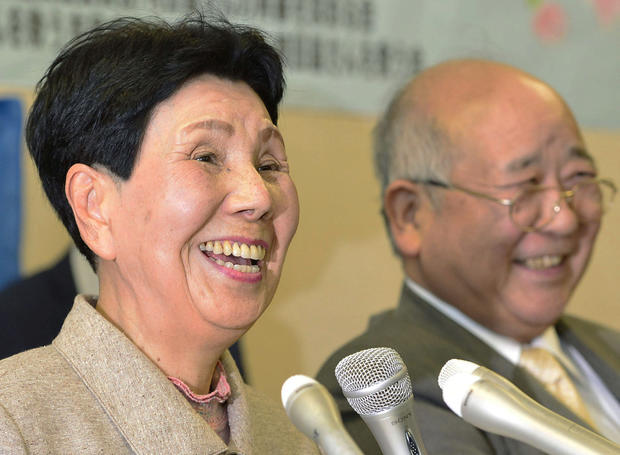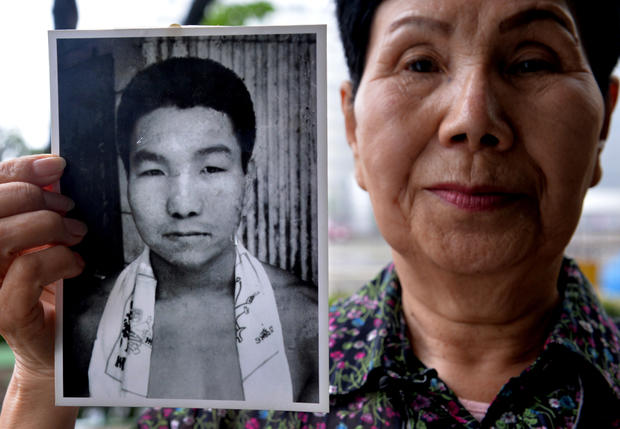World's longest-held death row inmate freed in Japan
TOKYO -- The world's longest-serving death row inmate was freed Thursday by a Japanese court which found investigators had likely fabricated evidence in the murder case that put the former pro boxer behind bars for nearly half a century.
The Shizuoka District Court suspended the death sentence and ordered a retrial for 78-year-old Iwao Hakamada, who had been convicted in the 1966 murder of a family and was sentenced to death in 1968. More than 45 of his 48 years in prison have been on death row, making Hakamada the longest-serving such inmate, according to Guinness World Records.
Hours later, Hakamada walked out of the Tokyo Detention Center, escorted by his sister as dozens of journalists and supporters waited outside. Hakamada looked briefly at the crowd and got inside a car without speaking.
Hakamada was not executed because of a lengthy appeals process. It took 27 years for the Supreme Court to deny his first appeal for a retrial. He filed a second appeal in 2008, and the court finally ruled in his favor on Thursday.
"It is unbearably unjust to prolong detention of the defendant any further," presiding Judge Hiroaki Murayama said in a statement. "The possibility of his innocence has become clear to a respectable degree."
Hakamada was convicted of killing a company manager and his family and setting fire to their central Japan home, where he was a live-in employee.
The court said Thursday that a DNA analysis obtained by Hakamada's lawyers suggested that investigators had fabricated evidence. Blood stains detected on five pieces of clothing, which investigators said were worn by the culprit during the crime, did not match the DNA of Hakamada, and trousers that prosecutors submitted as evidence were too small for Hakamada and did not fit when he tried them on.
Shizuoka District deputy chief prosecutor Takashi Nishitani said the ruling was unanticipated and that prosecutors would discuss whether to appeal.
The court's order for a retrial makes Hakamada only the sixth death row inmate to get a retrial in Japan's history of post-World War II criminal justice. Four were acquitted in their retrials, while the fifth inmate's case is still pending.
"We finally tore down the wall of retrial," said Katsuhiko Nishijima, head of the defense team. "We will challenge the court decisions, as well as police and prosecutors that have denied our appeals so many times."
Following criticism that Japan's lengthy court proceedings violate defendants' right to fair and speedy trial, the country has increased the number of judges to speed up the process while adding some transparency, including a jury system.
The United Nations' torture committee said in a 2013 report that Japan's routine interrogation of suspects in police custody, known as "substitute prison," often results in beating, intimidation and sleep deprivation. Justice authorities are discussing videotaping interrogations, but only partial recordings are being tested.
Japan is highly secretive about executions. Death row inmates are informed the morning they are hanged. Critics say executions without prior notice violate basic human rights and that secrecy and uncertainty cause unnecessary suffering for inmates. The Justice Ministry discloses only limited details afterward.
"It's totally unacceptable from a humane point of view," said Akira Kitani, a former judge, referring to Hakamada's long detention in fear. "We should take this opportunity to open a serious discussion about the death penalty."
More than 100 people are on death row in Japan, in solitary confinement, some of them for years.
"If ever there was a case that merits a retrial, this is it," Amnesty International said. It said questions about Hakamada's conviction based on a forced confession and the use of evidence must be answered. "The Japanese authorities should be ashamed of the barbaric treatment Hakamada has received," it said in a statement.
A Tokyo detention center official said Hakamada's mental and physical condition had declined in recent years, most likely due to prolonged detention. He said it was the first time a death row inmate has been released while his retrial is still pending.
Hakamada's sister, Hideko, 81, who devoted more than half of her life to the legal battle on her brother's behalf, said she was happy he is finally free.
"I just want to praise him for enduring all these years," she said, holding back tears and a smile at the same time. "Forty-seven years is an awfully long time."

